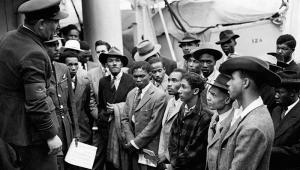
Theresa May, first as home secretary and then as prime minister, promised to get tough on immigration. She was as good as her word – but this came at a substantial cost.
Her ‘hostile environment’ policies didn’t just impact thousands of immigrants. They turned lives upside down for British citizens from the Windrush generation, as last week’s National Audit Office report concluded. And, crucially, they alienated public sector workers just as the prime minister asked for their support.
These were the sort of people to whom May reached out at first, with her heartfelt pledge to address injustice and toil.
May’s first words as prime minister from the Downing Street steps, appealed directly to those in Britain who were getting by but worried about what the future held.
“I know you’re working around the clock,” she said, talking straight to those voters. “I know you are doing your best, and I know that sometimes life can be a struggle.”
It was a good speech and a fine sentiment.
Public sector workers had been promised help but felt like they were being punished. It was unpleasant policy and poor politics.
But her keynote immigration policies created an extra burden for the sort of hard-pressed workers May had promised to help. The new rules required public sector staff to collect and store even more data, thousands upon thousands of bits of information to gather share with the Home Office. There were more Whitehall edicts to follow, more plans to establish, more data to process, none of it related to the jobs in hand.
Teaching assistants, overworked civil servants and NHS administrators already, justifiably, wanted to know why their pay had been frozen for five years. And they were now being told to do extra, unsavoury work with no obvious reward.
They had been promised help but felt like they were being punished. It was unpleasant policy and poor politics.
First came more demands on the NHS. In January 2017 the Home Office told doctors, nurses and health officials to share data on patients. In the dry words of the formal deal struck between the Home Office and Department of Health, healthcare data could now be used for “tracing immigration offenders.”
In practice it was a stitch-up to make the NHS a more potent weapon in May’s immigration clampdown.
Then there were additional rules for schools. From June 2016 – the month in which the country voted for Brexit and May’s campaign to be prime minister rolled into action – schools had been told to spend time collecting more data on children, including their nationality and country of birth, for passing on to the Home Office and others.
Schools duly shared details of more than 18,000 families with the Home Office in a single year, including names, addresses and even how often children turned up to lessons. Meanwhile in higher education, administrators were being forced to run ever-more invasive document checks on international students, again to pass along to immigration officials.
May was cranking up the pressure on staff across public services, all in pursuit of greater immigration control.
For many, frustration came to a head after May called a snap general election in 2017.
A nurse, questioning the prime minister from the Question Time audience, wanted to know why she hadn’t received a real-terms pay rise in eight years. “There is no magic money tree to pay for everything we want,” May told her, infamously.
In the studio, and for voters watching on television, it went down like a lead balloon. May had made life harder for people working in the public sector, and had no real answer for why they should put up with it, let alone vote for her.
May got it wrong. That election campaign exposed so many errors of judgment, including how hard-line immigration policies had heaped more work on people who were already fed-up and over-worked.
For them, those words on the steps of Downing Street now rang extremely hollow.
Adapted from Drawbridge Britain: Love and hostility in immigration policy from Windrush to the present (Eyewear Publishing)



















